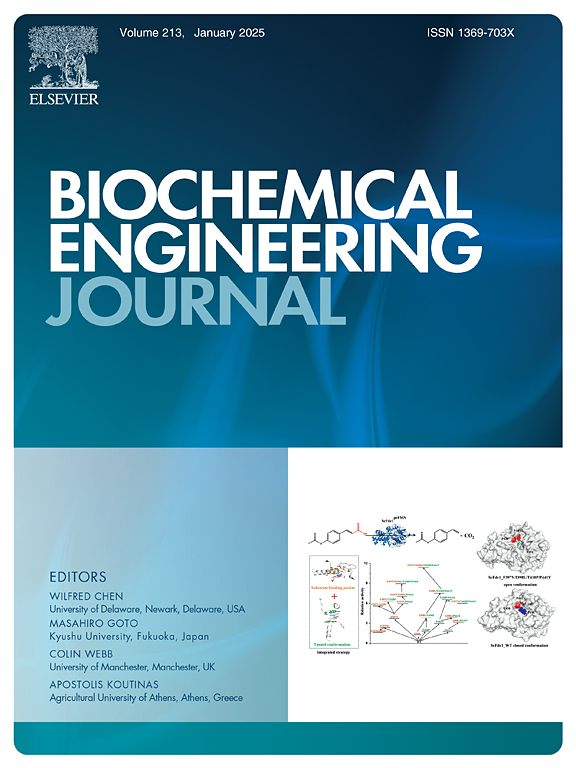Enhancing the production of xylitol in recombinant Escherichia coli BL21 by metabolic engineering
IF 3.7
3区 生物学
Q2 BIOTECHNOLOGY & APPLIED MICROBIOLOGY
引用次数: 0
Abstract
Xylitol, a pentose sugar alcohol with sweetness comparable to sucrose, has advantageous properties such as low caloric value and anti-cariogenic characteristics, leading to its extensive applications in food, chemical, and pharmaceutical industries. Current industrial production predominantly employs chemical catalytic methods, which suffer from high cost and environmental concerns. In contrast, microbial fermentation through metabolic engineering enables direct conversion of xylose to xylitol via microbial metabolism, demonstrating superior advantages of cost-effectiveness, environmental friendliness, and mild reaction conditions. This study developed an engineered Escherichia coli strain for high-efficiency xylitol production by implementing three key strategies: 1) introducing the heterologous xylose reductase gene xyrB, 2) optimizing NADPH cofactor supply, and 3) CRISPR/Cas9-mediated knockout of the competing pathway gene xylA. Subsequent fermentation condition optimization achieved remarkable production performance. Under optimized conditions with 15 g/L xylose and 10 g/L glucose in a 1-L shake flask system, the engineered strain E. coli BL21(DE3)/ΔptsGΔxylA-pETDuet-1 -xyrB-zwf demonstrated maximum xylitol production of 13.8 g/L (0.92 g/g xylose), representing significant improvement in bioconversion efficiency. This study contributes to the industrial production of xylitol by engineered strain E. coli BL21(DE3) via metabolic engineering.
利用代谢工程技术提高重组大肠杆菌BL21木糖醇的产量
木糖醇是一种甜度与蔗糖相当的戊糖醇,具有低热值、抗龋齿等优点,在食品、化工、医药等行业有着广泛的应用。目前的工业生产主要采用化学催化方法,这种方法存在成本高和环境问题。而微生物发酵通过代谢工程将木糖直接转化为木糖醇,具有成本效益高、环境友好、反应条件温和等优势。本研究通过引入外源木糖还原酶基因xyrB、优化NADPH辅助因子供应、CRISPR/ cas9介导敲除竞争通路基因xylA三个关键策略,构建了高效生产木糖醇的工程大肠杆菌菌株。后续发酵条件优化取得了显著的生产效果。在1-L摇瓶体系中,以15 g/L木糖和10 g/L葡萄糖为优化条件,工程菌株BL21(DE3)/ΔptsGΔxylA-pETDuet-1 -xyrB-zwf木糖醇产量最高,为13.8 g/L(0.92 g/g木糖),生物转化效率显著提高。本研究为工程菌株BL21(DE3)利用代谢工程技术工业化生产木糖醇奠定了基础。
本文章由计算机程序翻译,如有差异,请以英文原文为准。
求助全文
约1分钟内获得全文
求助全文
来源期刊

Biochemical Engineering Journal
工程技术-工程:化工
CiteScore
7.10
自引率
5.10%
发文量
380
审稿时长
34 days
期刊介绍:
The Biochemical Engineering Journal aims to promote progress in the crucial chemical engineering aspects of the development of biological processes associated with everything from raw materials preparation to product recovery relevant to industries as diverse as medical/healthcare, industrial biotechnology, and environmental biotechnology.
The Journal welcomes full length original research papers, short communications, and review papers* in the following research fields:
Biocatalysis (enzyme or microbial) and biotransformations, including immobilized biocatalyst preparation and kinetics
Biosensors and Biodevices including biofabrication and novel fuel cell development
Bioseparations including scale-up and protein refolding/renaturation
Environmental Bioengineering including bioconversion, bioremediation, and microbial fuel cells
Bioreactor Systems including characterization, optimization and scale-up
Bioresources and Biorefinery Engineering including biomass conversion, biofuels, bioenergy, and optimization
Industrial Biotechnology including specialty chemicals, platform chemicals and neutraceuticals
Biomaterials and Tissue Engineering including bioartificial organs, cell encapsulation, and controlled release
Cell Culture Engineering (plant, animal or insect cells) including viral vectors, monoclonal antibodies, recombinant proteins, vaccines, and secondary metabolites
Cell Therapies and Stem Cells including pluripotent, mesenchymal and hematopoietic stem cells; immunotherapies; tissue-specific differentiation; and cryopreservation
Metabolic Engineering, Systems and Synthetic Biology including OMICS, bioinformatics, in silico biology, and metabolic flux analysis
Protein Engineering including enzyme engineering and directed evolution.
 求助内容:
求助内容: 应助结果提醒方式:
应助结果提醒方式:


